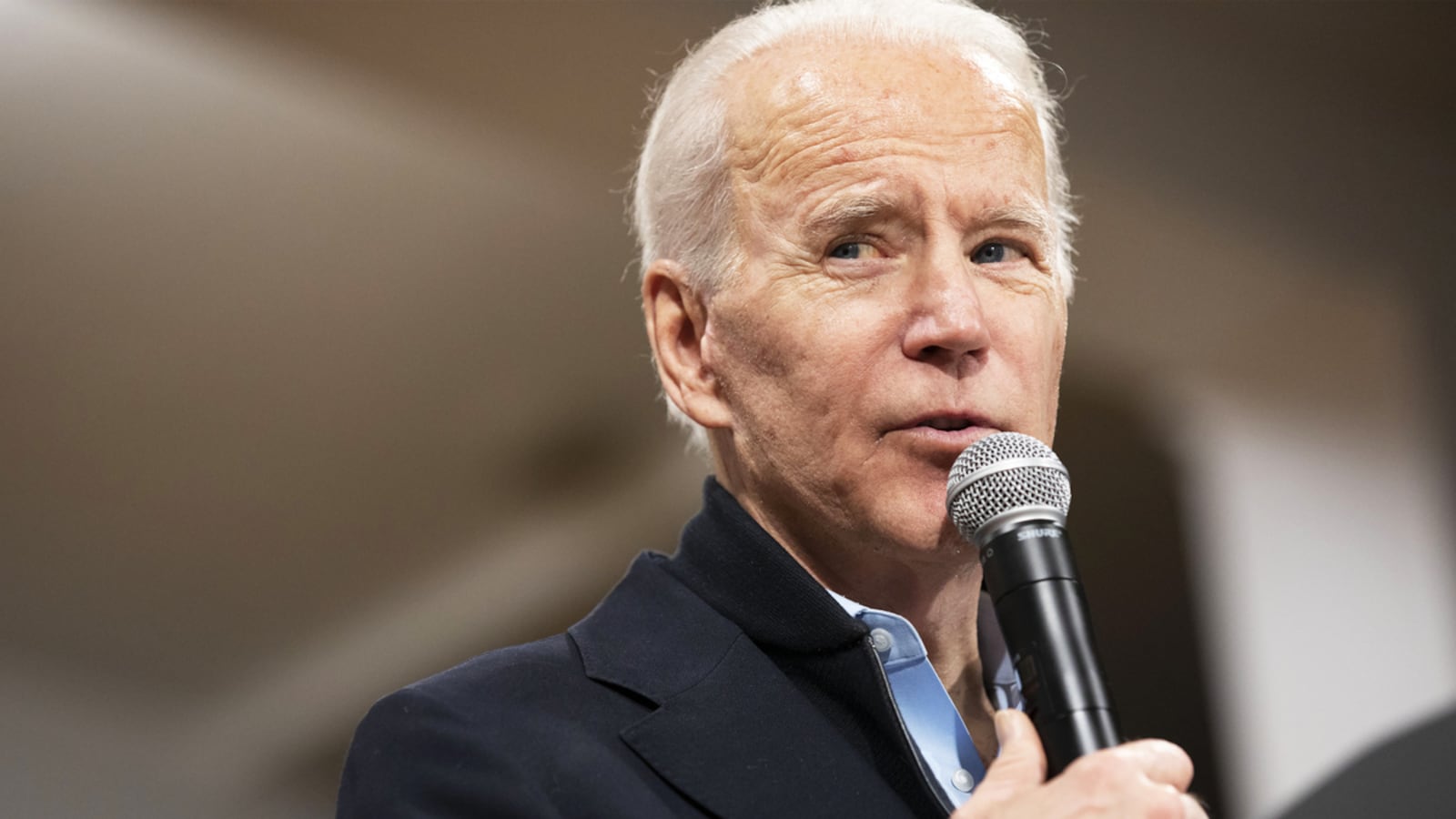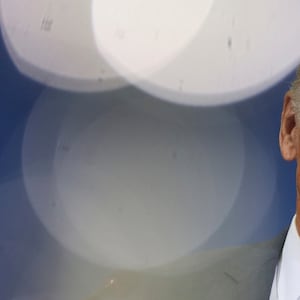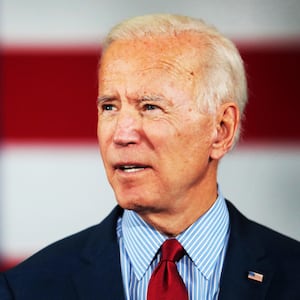EXETER, New Hampshire—Joe Biden’s campaign may be holding on for dear life in Iowa. But they say there’s no backup plan on the books to course correct for the New Hampshire primary if he limps out of the Monday caucus.
In interviews with campaign officials, endorsers, and surrogates here, the former vice president’s braintrust insists that their state operation is acting in total isolation from what is happening in Iowa, even though some privately concede they may need to right a damaged ship.
“What we're focused on in New Hampshire is putting in the hard work on the ground to be successful on February 11, not what happens in Iowa,” a Biden official in New Hampshire told The Daily Beast.
The prospect that Biden may need a campaign tweak, if not a total resuscitation, in New Hampshire has become more pronounced in recent days, as he’s watched Sen. Bernie Sanders (I-VT) surge to the lead in some Iowa polls. While he certainly could still pull out a win, the possibility exists that the former vice president finishes far back from the lead, which would make a stronger showing a week later more vital.
That could be tricky, as he will be going up against two rivals from neighboring states, Sanders of Vermont and Sen. Elizabeth Warren of Massachusetts. But there is some history for New Hampshire primary voters giving surprise wins to candidates needing an electoral boost. And there is ample precedent for Granite Staters’ fondness for exhibiting independent streaks when it comes to voting.
In 2000, Sen. John McCain (R-AZ) stunned George W. Bush by 18 percentage points, dampening the latter’s hopes of a quick nomination fight. In 2008, Hillary Clinton finished third in the Iowa caucuses after having been the prohibitive frontrunner for much of the preceding months. And in the week before New Hampshire voted, it seemed like then-Sen. Barack Obama would end up sweeping the first two states. But Clinton pulled out a surprise win, steadied her candidacy, and ended up prolonging the Democratic nomination fight for months.
Biden could find himself needing a similar bit of political defibrillation. Whether he can get it is less clear.
While the campaign has not officially lowered expectations in New Hampshire, the geographic advantages that Sanders and Warren enjoy are still high on the minds of his top allies.
“I’m one who still believes New Hampshire has two contests underway,” said Jim Demers, a prominent Democrat in the state who recently endorsed Biden after previously supporting Sen. Cory Booker (D-NJ). “The battle between the neighbors, and the battle amongst the rest of the field.”
Indeed, even for his biggest boosters, a scenario where Biden may not beat out Sanders or Warren is not unimaginable. “People will be looking to see which one of the neighbors wins,” Demers said.
Though the expectation remains that New Hampshire will be a tough road for the former VP, his team is optimistic that they can get enough of a bounce from the state to propel him toward friendlier terrain: Nevada and South Carolina; and parts of the Super Tuesday map, too.
“I don’t think there’s any ground game strategy that hinges on him winning or taking second place in Iowa,” said Demers. Those sentiments were picked up in conversations with other top party loyalists attached to Biden here.
At a canvas kickoff event at the Rockingham County Democrats’ office on an overcast Saturday afternoon in Exeter, a half-dozen Biden supporters shared anecdotes about local voters who have remained largely undecided but have started coming around to Biden, particularly as Trump’s impeachment trial in the Senate progressed along partisan lines. The former vice president has made an “electability” argument against the president central to his campaign since its onset in April.
“We don’t want him out of fear, but confidence,” one voter said simply.
Former Rep. Carol Shea-Porter, one of Biden’s most influential surrogates in the state, told supporters inside a small office—filled with just a handful of campaign pamphlets, some red and blue balloons, and a life-size cardboard cutout of the candidate in a blue suit—that perhaps his biggest appeal in New Hampshire is his personal connection to voters who place a premium on retail politics.
“Find those people who are just kind of thinking about it,” Shea-Porter instructed the six Biden canvassers to tell on-the-fence voters. “And tell them you’ve got good news.”
In an interview with The Daily Beast, Shea-Porter stressed that “people know” Biden, and “they trust him.” They’ve seen him in and out of the state for years. He has crossover appeal, she said. When pressed about the possibility that he doesn’t meet or exceed expectations in Iowa, she acknowledged that the subsequent states would become more significant while stressing that the nomination fight will likely be prolonged.
“Whatever it is in Iowa, it counts, it matters, but it’s not necessarily meaning anything for us,” she said. “It’s a really big country. As much as we matter, and we do, obviously there’s going to be other states that have a lot more delegates.”
“I don’t think you can draw any conclusion from Iowa and New Hampshire,” she said.
While New Hampshire residents tend to be independent—both ideologically and in their voting decisions—other Democrats here and in Iowa contend that the early election narrative for the former vice president relies on an acceptable showing.
Look no further than four years ago for a blueprint. While Clinton narrowly beat Sanders in the Iowa caucus in 2016, her presumed frontrunner status was thrown into question after being trounced by the Vermont senator in New Hampshire a week later. If the results are equally close in Iowa, where multiple candidates are currently within striking distance of each other, Biden could face a similar type of threat here, where Sanders leads in averages by nearly 10 points.
“It would be far less shocking than Hillary and Bernie,” said Sean Bagniewski, the chairman of Iowa’s Polk County Democrats, who is unaffiliated with any campaign. “I think he needs to be in the top three though.”
One former Clinton campaign official who watched the closer-than-expected Iowa scenario play out ahead of the New Hampshire pummeling in 2016 said it’s going to be hard either way for Biden.
“It’s a fine needle to thread,” the official said when asked about recalibrating here if Iowa isn’t a success. “They should have been really clear all along that the first two states aren’t make or break for them.”
Biden, by his own initial admission, has said he does not believe he needs to win New Hampshire, though he later said he thought he would. And with just days before the Feb. 11 primary, officials here are adamant that they are taking the state seriously, pointing to 55 staffers on the ground and 12 offices, comparable to some of his closest rivals. When the Iowa caucus was just a week out, the former vice president spent two days in New Hampshire. And when he’s been gone, a powerful slate of surrogates have worked the ground on his behalf. Popular former Gov. John Lynch recently wrapped up a five day, 10-county “Live Free Vote Joe” tour, while former Secretary of State John Kerry, who won the 2004 Democratic presidential primary, also spoke here recently, generating a humble crowed.
Still, Dante Scala, a political science professor at the University of New Hampshire, warned that all the prep work in the world may be for naught if Iowa ends up going poorly.
“I could see why they would say we’re not going to tweak anything, but I would say, if Biden does poorly in Iowa, they might as well chock up New Hampshire as a lost cause,” he said. “No amount of tweaking would change much if Biden’s the negative story coming out of Iowa.”







